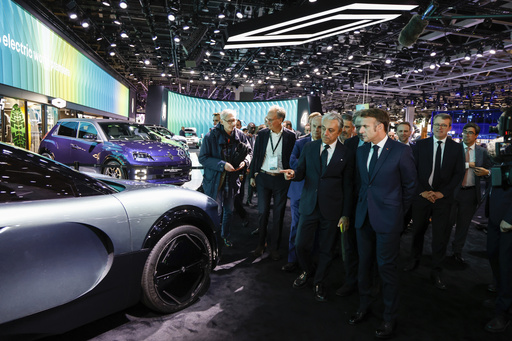
PARIS — As automakers compete to encourage drivers to transition to electric vehicles (EVs), they’re unveiling a range of affordable and technology-rich models at the Paris Motor Show, appealing to a broad audience that ranges from luxury customers to students awaiting their first driving experience.
This biennial event, which has been a prominent industry exhibition since its inception in 1898, is buzzing with activity. Despite potential EU tariffs that may impact sales of their electric cars, several Chinese manufacturers are participating in significant numbers. Meanwhile, longstanding European carmakers are ramping up their initiatives to attract consumers who have hesitated due to the high costs associated with EVs.
On Monday, the opening day, the show put the spotlight on various new electric models, particularly highlighting developments from Chinese companies.
CHINESE INNOVATIONS TAKING CENTER STAGE
Chinese startups like Leapmotor and XPeng have taken the opportunity to showcase vehicles that they claim feature advanced artificial intelligence capabilities. Leapmotor, which was founded in 2015, introduced an electric SUV named the B10, which is destined for production in Poland to cater to the European market. While pricing details were not disclosed, plans for the B10’s launch are set for the following year.
Additionally, the company presented a more compact electric vehicle, the T03, which has a competitive starting price of 18,900 euros ($20,620). Leapmotor noted that these units, while imported from China, would be assembled in Poland for the French market. Furthermore, the larger family vehicle, the C10, is set to begin sales in Europe at a starting price of 36,400 euros ($39,700). The firm is collaborating with Stellantis, the world’s fourth-largest car manufacturer, to facilitate sales outside of China, which commenced in September.
XPENG ANTICIPATES IMPORT CHALLENGES
Making its debut at the Paris show, XPeng showcased its sleek new sedan, the P7+. CEO He Xiaopeng expressed ambitions for European deliveries beginning next year. However, no specific pricing details for the P7+ in Europe have been revealed. In China, the vehicle starts at 209,800 yuan, roughly translating to 27,100 euros or $29,600.
The company’s president, Brian Gu, raised concerns that the EU’s proposed import duties could complicate their plans if diplomatic negotiations don’t yield favorable results before the end of October. He pointed out that the EU contends state subsidies enable Chinese manufacturers to dramatically underprice local industry, resulting in a significant market share increase for Chinese-built electric vehicles, which rose from just 3.9% in 2020 to 25% by September 2023.
“The tariff will exert considerable pressure on our business model, effectively squeezing our already tight margins,” Gu commented.
YOUNG DRIVERS EMERGING AS A TARGET MARKET
Manufacturers are also tapping into a burgeoning market for smaller electric vehicles that can be used by drivers as young as 14, enabling a safety alternative to motorbikes. Exhibited at the Paris show are several two-seater options, including Citroen’s Ami, which starts at just below 8,000 euros ($8,720). Originally launched in France in 2020, this cheeky, plastic-bodied vehicle is now available in various European territories, as well as in Turkey, Morocco, and South America.
“It’s not just a car; it’s a mobility object,” noted Alain Le Gouguec, Citroen’s product chief for the Ami.
European regulations allow young people without a full driving license to operate the Ami and similar vehicles after completing an eight-hour training course, with a maximum speed limit of 45 kilometers per hour (28 mph). This approach has also found favor among adults who either lost their licenses or never acquired one, especially in areas where public transport options are lacking.
Renault’s Mobilize introduced its Duo, a two-seater that can travel more than 100 kilometers (over 60 miles) between charges, even in winter. A mobile app serves a dual purpose as its ignition key and door lock. Another French company, Ligier, offers their no-license two-seaters in both diesel and electric models, further diversifying options for this emerging market.
